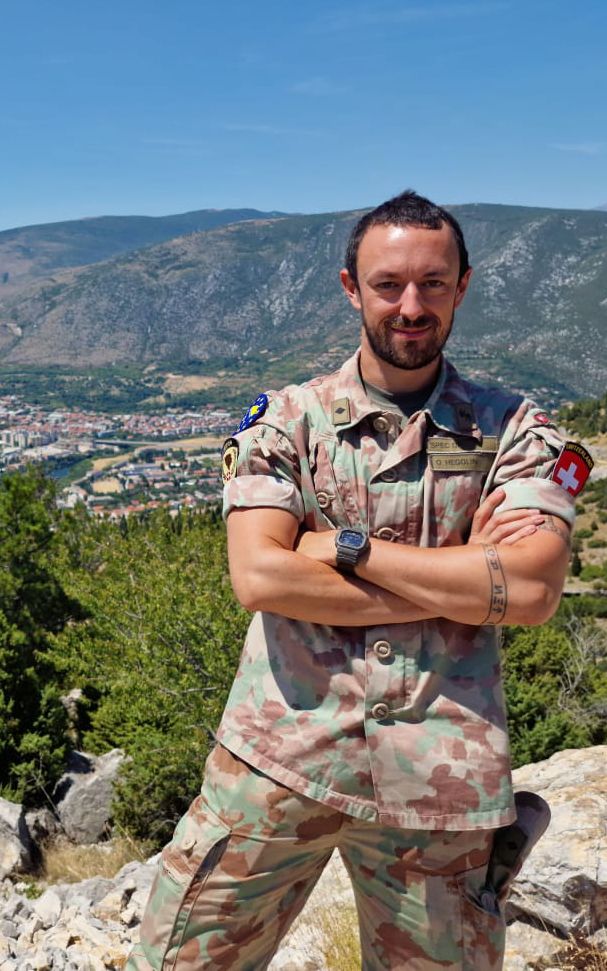
MAJORS AND MINORS
- International Studies and Anthropology Major
Experiential Learning
- Model United Nations, Student Government Association
- Study Abroad in Denmark, Finland, and Tanzania
CAMPUS ACTIVITIES
- International Studies Council & International Relations Club
- German Language Club
- “My four priorities, my four careers—nonprofit, military, academic and the private sector—provide me the opportunity to use what I've learned academically from Washington College and then at the Geneva Graduate Institute. Those four very different things are all connected through my interdisciplinary past, kickstarted at Washington College, which laid the foundation to have these different outlets in these different sectors. In the end, the skills and know-how is the same for each one. The only difference is how the information that I can provide and the skills I can provide are being used.”

From Two Majors to Four Careers
Oliver Hegglin '13
Zug, SwitzerlandMAJORS AND MINORS
- International Studies and Anthropology Major
Experiential Learning
- Study Abroad in Denmark, Finland, and Tanzania
CAMPUS ACTIVITIES
- International Studies Council & International Relations Club
- German Language Club
- “My four priorities, my four careers—nonprofit, military, academic and the private sector—provide me the opportunity to use what I've learned academically from Washington College and then at the Geneva Graduate Institute. Those four very different things are all connected through my interdisciplinary past, kickstarted at Washington College, which laid the foundation to have these different outlets in these different sectors. In the end, the skills and know-how is the same for each one. The only difference is how the information that I can provide and the skills I can provide are being used.”
Earlier in his still-young career, he worked for a nonprofit organization in Switzerland
and Bolivia, and he is currently a board member of the Yvonne and Peter Imholz Foundation,
which supports projects by small NGOs and individuals that further any of seven United
Nations Sustainable Development Goals.
“My four priorities, my four careers—nonprofit, military, academic and the private sector—provide me the opportunity to use what I've learned academically from Washington College and then at the Geneva Graduate Institute,” Hegglin said. “Those four very different things are all connected through my interdisciplinary past, kickstarted at Washington College, which laid the foundation to have these different outlets in these different sectors.”
Hegglin grew up in an international family. His father is from Switzerland, his mother from Andalucia in Spain, and he grew up speaking both German and Spanish. The house he lived in the longest was in New York, his parents are now in Florida, but his extended family's region of Zug in Switzerland is where Hegglin feels at home.
Graduating from high school in New York, Hegglin wanted to develop an international career, and at Washington College he found an international studies program unlike any other he had researched. Over his four years at Washington, Hegglin studied French—an important diplomatic language—and dove deep into Arctic affairs after being introduced to the topic in a class. (His senior thesis examined the ways Arctic countries used their indigenous populations to justify territorial claims.) Hegglin was influenced by professors from disciplines across the College, including in international studies, anthropology, and world languages.
After graduation, Hegglin completed internships at the Swiss Embassy in Nigeria and the Permanent Mission of Liechtenstein to the United Nations before earning a master's degree in international affairs from the Geneva Graduate Institute. During that time, he began his national service in the Swiss Armed Forces, which helped him reintegrate after living in the United States and led to his peacekeeping missions.
In his latest posting in Mostar, Bosnia-Herzegovina, Hegglin has been an officer-in-command for European Union Force (EUFOR) Althea.
Hegglin leads an eight-person team that talks with locals, constantly monitoring tensions, friendships, the influence of current events, the impact of rhetoric by politicians whether domestic or foreign, and whatever else they hear from people across all ethnic, religious, linguistic, and other backgrounds. They file daily reports about what they learn, which inform decision-makers at the many levels of international cooperation behind the mission: the United Nations that mandated it and the European Union carrying it out.
One moment brought home the importance of what they do for Hegglin: monitoring the exhumation of what was presumed to be a mass grave from the Bosnian war.
“For many people, it's in the history books, but it showed why it was important for us, for the peacekeepers to be there as witnesses to the ongoing post-conflict developments, since it is still a sensitive area,” Hegglin said. “Being here on the ground, being in touch with the people, shows that the entire community still cares.”
— Mark Jolly-Van Bodegraven